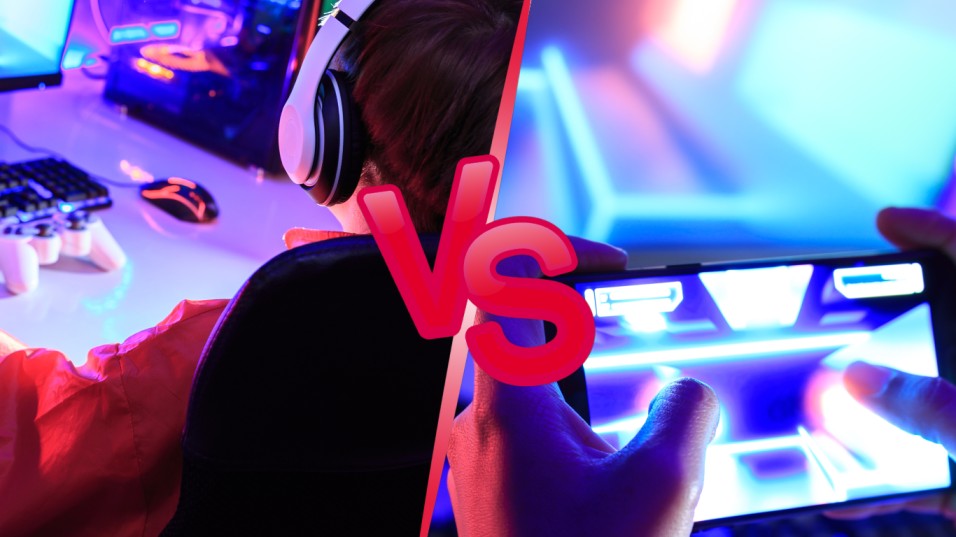
PC and mobile games are two of the most popular forms of gaming worldwide, sparking debates over PC Games vs Mobile Games. Both offer a variety of genres, styles, and experiences for gamers of all ages and preferences. But what are the main differences between PC games and mobile games? How do they compare in terms of graphics, gameplay, accessibility, and monetization? In this article, we will explore these questions and more, and help you decide which platform suits your gaming needs better.
One of the most obvious differences between PC games and mobile games is the quality of graphics. PC games generally have higher resolution, more details, and more realistic effects than mobile games. This is because PCs have more powerful hardware, such as processors, graphics cards, and memory, that can handle more complex and demanding graphics.
PC games also have more options for customizing the graphics settings, such as resolution, frame rate, anti-aliasing, and texture quality, to suit the preferences and capabilities of the user. Mobile games, on the other hand, have lower graphics quality than PC games. This is because mobile devices have less powerful hardware, smaller screens, and limited battery life, which constrain the graphics performance.
Mobile games also have fewer options for adjusting the graphics settings and often rely on automatic optimization to balance the graphics quality and the device performance. However, this does not mean that mobile games are inferior to PC games in terms of graphics. Mobile games have their advantages, such as portability, convenience, and innovation, that make them appealing to many gamers.
Another major difference between PC games and mobile games is the gameplay. PC games generally have more complex, immersive, and diverse gameplay than mobile games. This is because PC games have more input devices, such as keyboards, mice, controllers, and joysticks, that allow for more precise and varied control over the game. PC games also have more genres, such as strategy, simulation, role-playing, and first-person shooters, which require more skills, tactics, and creativity from the player.
Mobile games, on the other hand, have simpler, casual, and repetitive gameplay than PC games. This is because mobile games have fewer input devices, such as touchscreens, accelerometers, and gyroscopes, that limit the control and interaction with the game.
Mobile games also have fewer genres, such as puzzle, arcade, and casual, that require fewer skills, tactics, and creativity from the player. However, this does not mean that mobile games are boring or easy to play. Mobile games have their advantages, such as accessibility, affordability, and sociality, that make them fun and engaging for many gamers.
Another important difference between PC games and mobile games is accessibility. PC games generally have less accessibility than mobile games. This is because PC games require more resources, such as hardware, software, and internet connection, that are not always available or affordable for everyone.
PC games also require more time, space, and attention, which are not always convenient or suitable for everyone. PC games are usually played at home, at work, or dedicated gaming venues, such as internet cafes, gaming centers, and esports arenas.
Mobile games, on the other hand, have more accessibility than PC games. This is because mobile games require fewer resources, such as hardware, software, and internet connection, and are more widely available and affordable for everyone.
Mobile games also require less time, space, and attention, which are more convenient and suitable for everyone. Mobile games are usually played anywhere, anytime, and anyhow, such as on the bus, in the park, or in in in in the bed.
Another significant difference between PC games and mobile games is the monetization. PC games generally have more upfront costs than mobile games. This is because PC games require more initial investment, such as buying the hardware, the software, and the subscription, which can be expensive and exclusive for some gamers.
PC games also have more additional costs, such as buying the expansions, the DLCs, and the Microtransactions, that can be optional and excessive for some gamers.
Mobile games, on the other hand, have less upfront costs than PC games. This is because mobile games require less initial investment, such as downloading the app, which can be free and inclusive for most gamers.
Mobile games also have fewer additional costs, such as watching the ads, in-app purchases, and subscriptions, which can be voluntary and reasonable for most gamers.
PC games generally cost more than mobile games, both in terms of initial and additional expenses. If you have a limited budget, you may prefer mobile games that are cheaper faster, and ee to play.
PC games require a compatible and powerful PC that can run the games smoothly and efficiently. If you have an old or low-end PC, you may not be able to play, some PC games or enjoy their full graphics potential. Mobile games require a compatible and functional mobile device that can support the games.
If you have a new or high-end mobile device, you may be able to play some mobile games with decent graphics and Performance preference: PC games offer more genres, styles, and experiences than mobile games. If you like more complex, immersive, and diverse games, you may prefer PC games that cater to your tastes.
Mobile games offer more accessibility, convenience, and sociality than PC games. If you like more casual, simple, and engaging games, you may prefer mobile games that suit your needs.
PC games require more time, space, and attention than mobile games. If you have a lot of free time, a dedicated gaming area, and a focused mindset, you may enjoy PC games that demand more from you.
Mobile games require less time, space, and attention than PC games. If you have a busy schedule, a flexible gaming environment, and a relaxed attitude, you may enjoy mobile games that adapt to you.
Ultimately, the choice between PC games and mobile games is up to you. You can try both platforms and see which one you like better. You can also play both platforms and switch between them depending on your mood, situation, and availability. There is no right or wrong answer, as both platforms offer enjoyable and rewarding gaming experiences.
PC games and mobile games are two different forms of gaming that have their pros and cons. PC games have better graphics, more complex gameplay, less accessibility, and more upfront costs than mobile games. Mobile games, on the other hand, typically feature lower graphics, simpler gameplay, more access, and ability, and fewer upfront costs compared to PC games.
What are the differences between PC games and mobile games? Ultimately, the choice between PC games and mobile games depends on the preferences, needs, and resources of each gamer. There is no right or wrong answer, as both platforms offer enjoyable and rewarding gaming experiences.
As of March 2024, Google Play Store had over 3.95 million games, and Apple App Store had over 1.1 million. Steam reported over 50,000 games as of April 2021, excluding exclusives on platforms like Epic Games Store, Origin, and GOG. It’s hard to say which platform has more games due to their vast and diverse selections.
It varies based on personal preference. PC games are known for graphics, gameplay, and diversity, while mobile games offer accessibility, affordability, and social features. Some enjoy both for different reasons. To decide, try games on both and see what you prefer.
In 2024, the PlayStation 5 is praised for its fast hardware and exclusive games, making it the top gaming platform. Twitch remains dominant in game streaming with a large share of content and active streamers. Both platforms offer excellent experiences for gamers worldwide, whether playing or streaming gameplay.

Owen is a tech enthusiast and blogger who loves to explore the latest trends and innovations in the world of technology. He writes about topics such as artificial intelligence, blockchain, cybersecurity, and more. He enjoys sharing his insights and opinions with his readers and engaging with them in lively discussions. When he is not writing, he likes to play video games, watch sci-fi movies, and travel to new places.